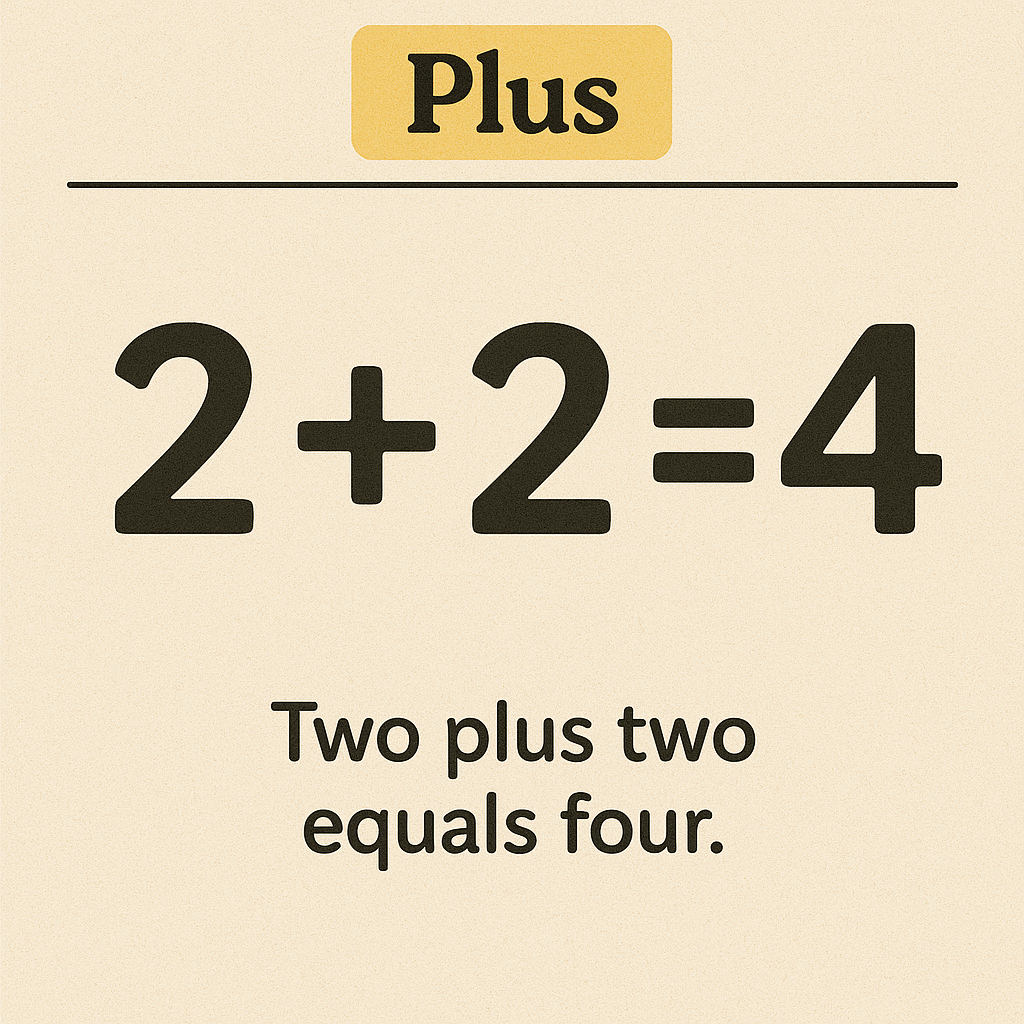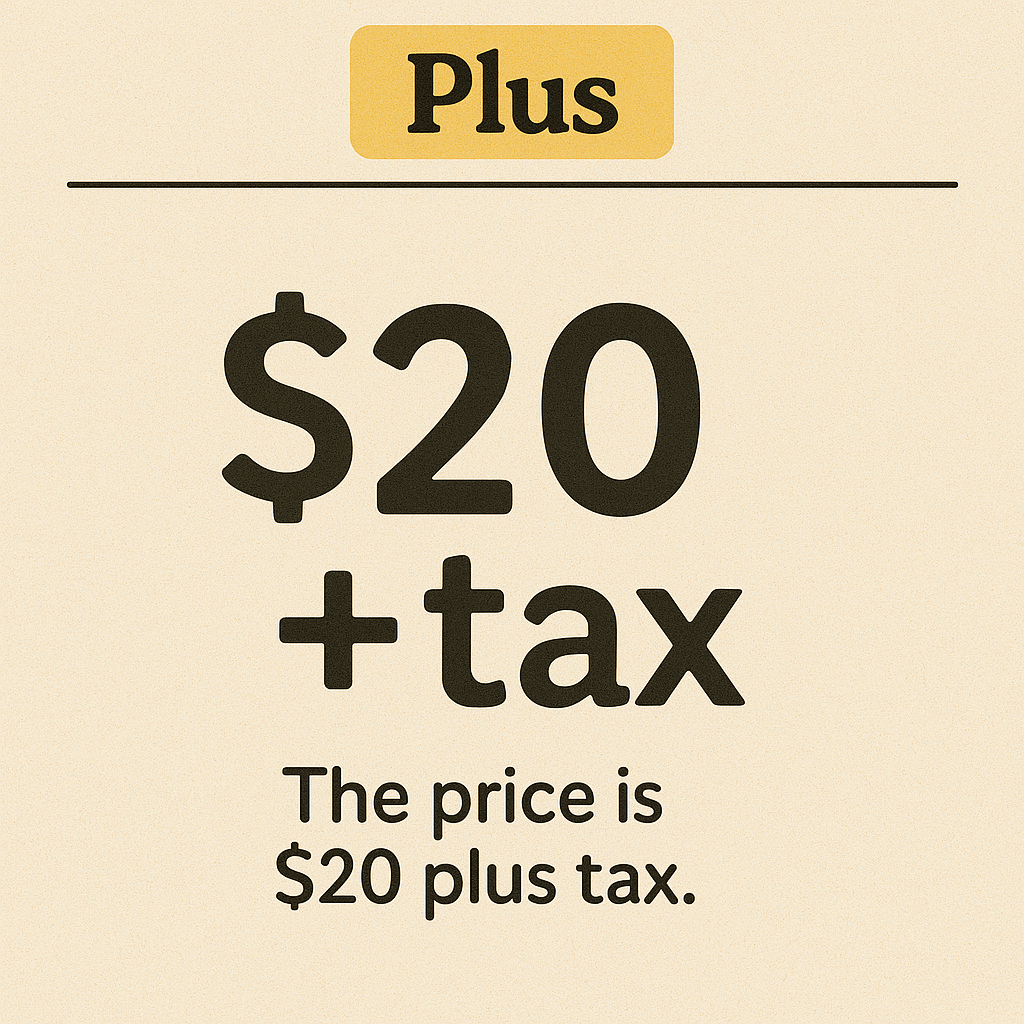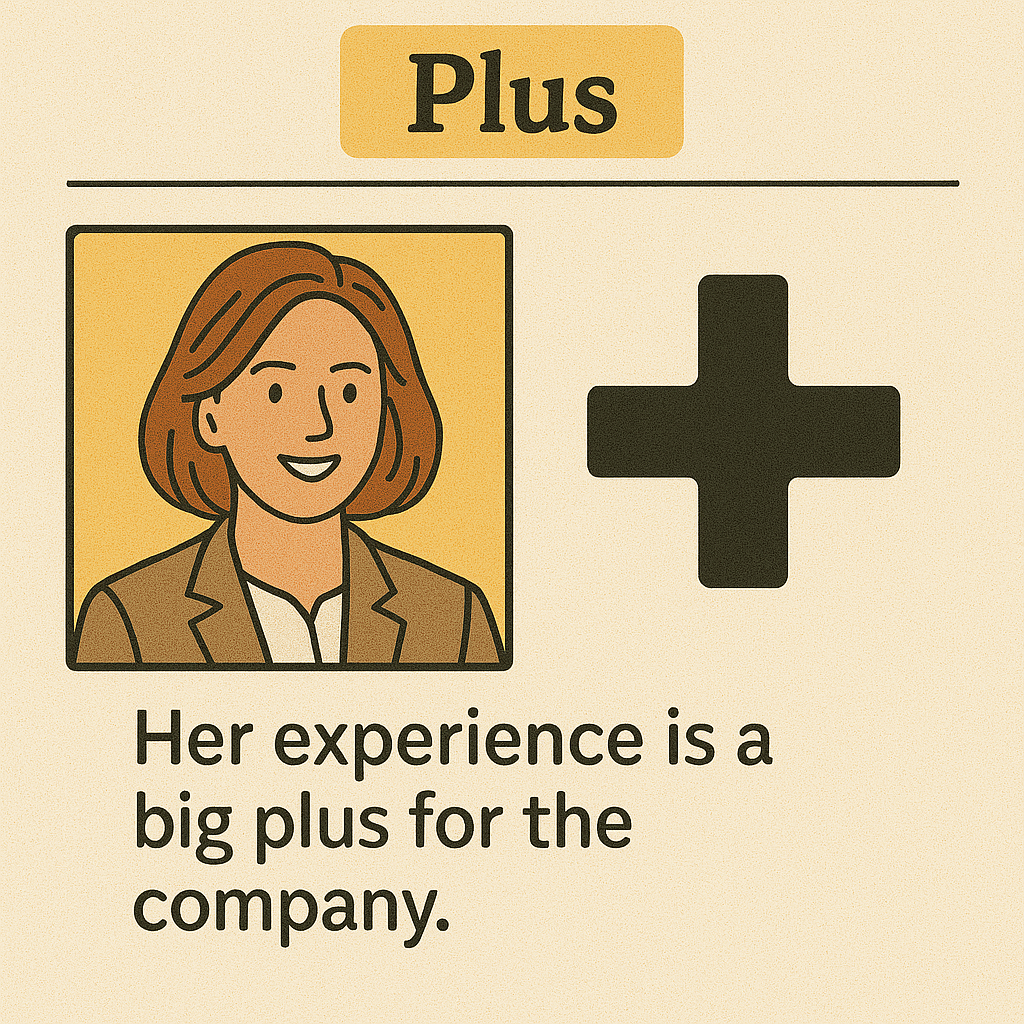Plus
Definition
The term "plus" describes something that is additional, positive, or used to signify the addition of numbers, items, or benefits.
Parts of Speech
- Conjunction
- Preposition
- Noun
- Adjective
Pronunciation
American English
- IPA Pronunciation: /plʌs/
- Respelling: PLUSS
British English
- IPA Pronunciation: /plʌs/
- Respelling: PLUSS
Etymology
The word "plus" originates from Latin "plus," meaning "more." It entered Middle English in the 15th century, primarily in mathematical and quantitative contexts.
Derivatives
- Plus-size (adjective)
- Plus-minus (noun)
- Plusses (noun, plural)
- Overplus (noun)
- Surplus (noun, related)
Synonyms
- Addition
- Benefit
- Positive
Antonyms
- Minus
- Negative
- Deficit
Usage
The term "plus" is commonly used in mathematical, conversational, and descriptive contexts. For example: "Five plus three equals eight," or "Her creativity is a major plus for the team."
Related Terms
- Addition: The process of combining numbers or items.
- Surplus: An excess or additional amount.
- Positive: Denoting a beneficial or advantageous aspect.
Detailed Definitions
Conjunction
- Used to connect numbers or items in addition: Indicates the act of combining or adding.
- Example: "Two plus two equals four."
Preposition
- Meaning 'in addition to': Refers to the inclusion of something extra.
- Example: "The price is $20 plus tax."
Noun
- An advantage or beneficial feature: Refers to a positive aspect or quality.
- Example: "Her experience is a big plus for the company."
Adjective
- Positive or additional: Describes something that is more than or above a certain standard.
- Example: "The plus version of the phone offers extra features."
plus



🇨🇳 Mandarin
- 加 (jiā) - plus (addition)
- IPA: /tɕja˥/
- Respelling: jia
- 另外 (lìngwài) - plus (and also)
- IPA: /liŋ˥˩ u̯aɪ̯˧˥/
- Respelling: ling-wai
🇮🇳 Hindi
- प्लस (plus) - plus (addition)
- IPA: /plʌs/
- Respelling: plus
- और (aur) - plus (and also)
- IPA: /ɔːr/
- Respelling: aur
🇪🇸 Spanish
- Más - plus (addition)
- IPA: /mas/
- Respelling: mas
- Además - plus (and also)
- IPA: /aðeˈmas/
- Respelling: a-de-mas
🇫🇷 French
- Plus - plus (addition)
- IPA: /plys/
- Respelling: plys
- En outre - plus (and also)
- IPA: /ɑ̃ utʁ/
- Respelling: en ou-tre
🇸🇦 Modern Standard Arabic
- بالإضافة إلى (bi al-idafah ila) - plus (addition)
- IPA: /bi alʔiˈdaːfa ʔilaː/
- Respelling: bi al-i-daf-ah i-la
- وأيضا (wa'aydan) - plus (and also)
- IPA: /waʔajdan/
- Respelling: wa-ay-dan
🇧🇩 Bengali
- প্লাস (plus) - plus (addition)
- IPA: /plʌs/
- Respelling: plus
- এবং (ebong) - plus (and also)
- IPA: /ebɔŋ/
- Respelling: e-bong
🇷🇺 Russian
- Плюс (plyus) - plus (addition)
- IPA: /plʲus/
- Respelling: plyus
- Также (takzhe) - plus (and also)
- IPA: /takʐɛ/
- Respelling: tak-zhe
🇵🇹 Portuguese
- Mais - plus (addition)
- IPA: /ˈmajʃ/
- Respelling: maysh
- Além disso - plus (and also)
- IPA: /aˈlẽj̃ diˈso/
- Respelling: a-lem di-so
🇮🇩 Indonesian
- Plus - plus (addition)
- IPA: /plʌs/
- Respelling: plus
- Dan juga - plus (and also)
- IPA: /dan juga/
- Respelling: dan ju-ga
🇩🇪 German
- Plus - plus (addition)
- IPA: /plʊs/
- Respelling: plus
- Außerdem - plus (and also)
- IPA: /ˈaʊ̯ɐdeːm/
- Respelling: au-er-dem
🇯🇵 Japanese
- プラス (purasu) - plus (addition)
- IPA: /pu͍ɾa̠sɯ̟ᵝ/
- Respelling: pu-ra-su
- さらに (sara ni) - plus (and also)
- IPA: /saɾa ni/
- Respelling: sa-ra ni
🇻🇳 Vietnamese
- Cộng - plus (addition)
- IPA: /kʊwŋm˧ˀ˦/
- Respelling: kowng
- Thêm nữa - plus (and also)
- IPA: /ʈʰeːm˧ˀ˦ nʊə˧ˀ˦/
- Respelling: them nu-a
🇰🇷 Korean
- 더하기 (deohagi) - plus (addition)
- IPA: /tʌ.ha.gi/
- Respelling: deo-ha-gi
- 게다가 (gedaga) - plus (and also)
- IPA: /ɡɛ.da.ɡa/
- Respelling: ge-da-ga
🇹🇷 Turkish
- Artı - plus (addition)
- IPA: /aɾˈtɯ/
- Respelling: ar-ti
- Ayrıca - plus (and also)
- IPA: /ajˈɾɯd͡ʒa/
- Respelling: ay-ri-ca
🇵🇰 Urdu
- پلس (plus) - plus (addition)
- IPA: /plʌs/
- Respelling: plus
- اور (aur) - plus (and also)
- IPA: /ɔːr/
- Respelling: aur





